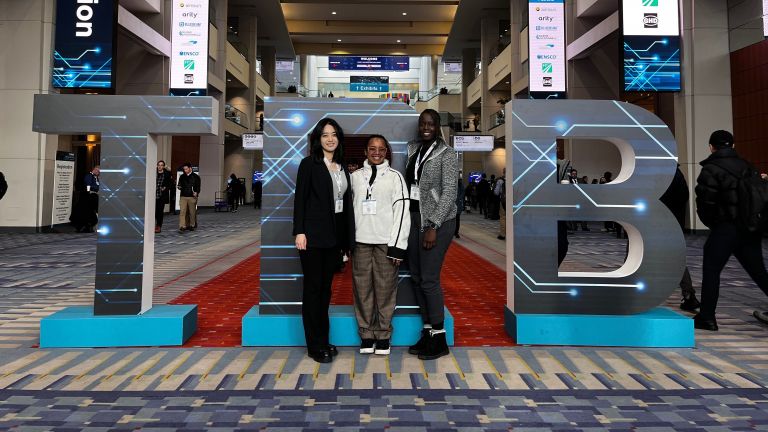January 14, 2025
Four civil engineering PhD students attended the conference presenting their research around improvements in transportation and safety. Two of the students received an award for their co-authored work.

Mizzou Engineering is home to experts in transportation safety working to improve infrastructure and conduct research that benefits Missourians and others on the roads.
This month, researchers were recognized on a national stage at the Transportation Research Board (TRB) Annual Meeting in Washington, D.C. Four PhD students, Elizabeth Arthur, Tanner Muturi, Neema Jakisa Owor and Linlin Zhang, had eight papers accepted for presentation at the conference covering research in emerging areas, including artificial intelligence, big data analytics and robotics.
Technology solving real-world problems
The students’ research is advised by Yaw Adu-Gyamfi, an associate professor of civil and environmental engineering and expert in traffic operations, intelligent transportation systems, big data analytics and artificial intelligence. While their work overlaps, each of the four focuses on a different problem in today’s transportation landscape.
The work Muturi submitted to TRB centers around removing shadows from images taken by condition monitoring vehicles.
“Shadows make it very difficult to detect cracks,” she said. “We’re using generative AI to remove shadows from images so that our machine learning models can better detect cracks and other issues. I love the computing aspect of the work, and the integration of these different technologies means I’m always doing something exciting.”
Owor also uses artificial intelligence by combining large language models with computer vision research. For one prong of her work, she’s developing a chatbot specifically trained on transportation data to be used by other civil engineering researchers. The second prong of her research centers on improving safety in work zones by improving alert systems.
In work zones, vehicles are equipped with a track mounted attenuator, or a TMA. Owor is collaborating with Zhang, who specializes in Light Detection and Ranging (LiDAR) and big data analytics, to apply the technology to TMAs so that when vehicles are on a collision course, workers are alerted before an accident happens.
In addition to working with Owor, Zhang’s research focuses on developing a framework that fuses data from an image with LiDAR to predict the reflectivity intensity of transportation infrastructure, such as speed limit or stop signs, at a pixel level. She says this approach provides a safer and more efficient way to predict infrastructure reflectivity.
“When signs on the side of the road aren’t reflective, it can be difficult for drivers to read them at night which leads to unsafe driving,” Zhang, who defended her PhD this fall, said. “Once I became interested in the fusion of these two technologies, and I decided to explore their fusion as a way to develop a safer and more efficient transportation system.”
Zhang also co-authored a paper with Arthur, titled, “Automated FHWA Vehicle Classification System via LiDAR and Camera Data Fusion,” which won the Young Scholar Award at the conference. The paper explores a novel approach to FHWA vehicle classification by integrating LiDAR and camera data.
Arthur says their findings demonstrate improved classification accuracy across vehicle categories, offering insights for developing more efficient transportation systems.
“I am deeply honored by this recognition, which reflects the hard work of our research group, the Zou Trans Lab, under the guidance of Dr. Adu-Gyamfi,” she said. “It is motivating to see our efforts acknowledged, and it inspires me to continue contributing meaningfully to advancements in the transportation industry.”
Inspired by interdisciplinary innovation
Owor says she chose to attend Mizzou for her PhD after being interested in the current faculty’s interdisciplinary work.
“I saw that some of the professors were doing research that was combining AI and transportation and that marveled me,” she said. “I was excited I could combine civil engineering with AI. When I applied, the faculty asked if I had any knowledge in Python, and I didn’t know anything at the time. So, I took some online courses to gain the required experience before applying. And I don’t have any regrets.”
Now, the students are paying it forward by mentoring other civil engineering students.
“I’ve always enjoyed exploring new ideas and innovations in the transportation field, and mentoring gives me the opportunity to share this knowledge and my experiences with others,” Zhang said. “It’s rewarding for me to share and help students, to see them overcome challenges. Mentoring can help me to guide others while also encouraging me to reflect on my own work and continue learning along the way.”
Owor added that the trio’s success would have been more difficult without Adu-Gyamfi, who has been a supportive advisor. Muturi and Zhang agreed.
“I do my best to support my students, but their tenacity and drive to produce novel research findings speaks for itself,” Adu-Gyamfi said. “I’m incredibly proud of the work they’re doing and it’s wonderful to see it recognized by the Transportation Research Board. I look forward to seeing their findings published in journals soon.”
Pursue a graduate degree in civil engineering at Mizzou. Learn more!